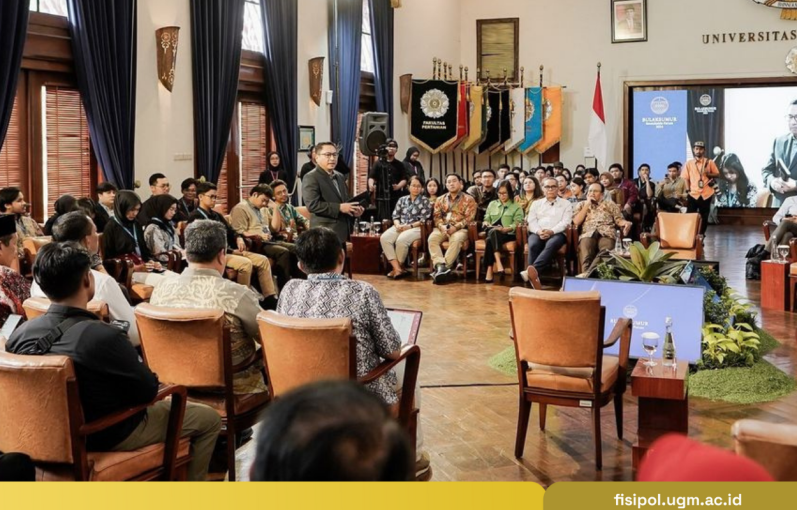
Yogyakarta, 9th of August 2024—The Department of Politics and Government of Fisipol UGM, through the Collaborative Hub for Politics and Policy on Sustainability (CoPPS), have organized the first Bulaksumur Roundtable Forum with the title of “Managing the Dilemma of Decentralization and Sustainability” on Friday (9/8) at UGM’s Balai Senat. This forum will feature academics, government officials, as well as business actors to dialogue on discussing both the issues of sustainability and evaluating the practices of local autonomies and local politics. Furthermore, this forum is also expected to be able to produce policy recommendations and strategic steps on promoting a new direction for further decentralization, which will have more emphasis on multi sector collaboration.
Abdul Gaffar Karim, as Head of the Department of Politics and Government as well as the chairperson of the Bulaksumur Roundtable Forum, explained that Indonesia has many aspirations and dreams. Three of them include the dream to improve the welfare of the citizens by improving the economy, to create a living environment that is much better, and to push for better decentralization.
“But, what we often forget is the fact that most of these aspirations and dreams of Indonesia are not necessarily aligned with each other. Decentralization can pose a dilemma towards environmental protection and vice versa. Economic growth through extractive-heavy industries can also threaten the environment and vice versa,” he mentioned.
Purwo Santoso, as an expert in environmental politics of UGM, has admitted that combining both the notion of sustainability and decentralization is difficult. Notions of sustainability demands that there will be both standardization and integration in each area, so the government can commit to an uniformed decentralization policies to these diverse areas. State policies of decentralization, according to Syarmadani, the Director of Domestic Politics, Directorate General of Politics and Public Administration, are still inconsistent. “Sometimes, it does push towards decentralization, but sometimes it goes the other way around and pushes further centralization,” Syamardani explained.
Haryanto, as an expert of domestic politics in UGM, assessed the implementation of current policies of decentralization as one that will actually lead to inequality among the areas. “These areas should be treated not as an uniformed self, but as individual areas with their own separate objective conditions. Other than that, this can also lead to the decline of public trust towards the government,” Haryanto mentioned.
The first Bulaksumur Roundtable Forum also presented Thomas Umbu Pati, as Deputy Head of Development Control at the Nusantara Capital City Authority. He came here to talk about both governance and development of the Nusantara Capital City. “Learning from current government practices, there seems to be a contest between government agencies,” Thomas said. In handling this problem, the Nusantara Capital City Authority, which exists as a provincial-level local government, has full authority regarding the development of the Nusantara Capital City due to the fact that its position is equal to a ministry. But, Thomas ensured that there are still checks and balances in regards to its accountability. Thomas also added that the development of the newly Capital City of Nusantara contains the notions in sustainable development, such as green and sustainability.
From the private sector, Neneng Goenadi, as Country Managing Director of Grab Indonesia, emphasized collaboration between the government and private industries on facing the ever so changing technological developments and digital transformation, that has been proven to change how people live their lives. In relevance to that, Neneng viewed that the government is on the losing side when it comes to forming the relevant policies and regulation. “In order to maximize the potential of technologies, the government and the industrial sector needs to be much faster and adaptable in facing high-stages of technological development,” Neneng stated. Neneng herself recommended the government and the industries to learn together through the process of joint continuous learning.
Furthermore, the application of sustainability is no longer an option, but it is now a must to the business sectors. Silverius Oscar Unggul, Vice Chairman of Kadin for Environment and Forestry, mentioned that the absence of sustainability in development will lead to the loss of both investment and the market in Indonesia. “Both of these things can be a huge pressure to businesses. With that in mind, the government must be able to adapt to this,” Silverius firmly stated.
